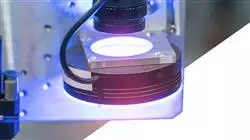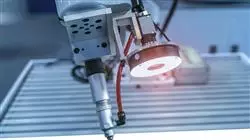University certificate
The world's largest faculty of information technology”
Introduction to the Program
Acquire new knowledge about Object Tracking Algorithms and Advantages of Pretrained Models, thanks to the best online university in the world according to Forbes"

Processing sequences are a fundamental technique in Deep Learning that has proven to be very effective in solving problems in different fields. These techniques allow neural networks to understand the temporal or spatial structure of the input data, which improves the accuracy of predictions and the quality of solutions.
For this reason, TECH has designed a Postgraduate certificate in Deep Learning Processing Sequences with which it seeks to provide students with the necessary skills and competencies to be able to perform their work as specialists, with the highest possible efficiency and quality. Therefore, throughout this program, aspects such as Natural Language processing or Generative Models, Principal Component Analysis or Cross Validation will be addressed.
All this, through a convenient 100% online modality that allows students to organize their schedules and studies, combining them with their other work. In addition, this degree has the most complete theoretical and practical materials on the market, which facilitates the student's study process and allows them to achieve their objectives quickly and accurately.
Become an expert in Deep Learning in only 6 weeks and with total freedom to organize your schedule, so you can combine your studies with your other occupations”
This Postgraduate certificate in Deep Learning Processing Sequences contains the most complete and up-to-date program on the market. The most important features include:
- The development of case studies presented by experts in Deep Learning Processing Sequences
- The graphic, schematic and eminently practical contents of the book provide sporting and practical information on those disciplines that are essential for professional practice
- Practical exercises where self-assessment can be used to improve learning
- Its special emphasis on innovative methodologies
- Theoretical lessons, questions to the expert, debate forums on controversial topics, and individual reflection assignments
- The availability of access to content from any fixed or portable device with an Internet connection
Reach your maximum potential as an expert in Deep Learning Processing Sequences, thanks to TECH and the most innovative materials”
The program’s teaching staff includes professionals from sector who contribute their work experience to this educational program, as well as renowned specialists from leading societies and prestigious universities.
Its multimedia content, developed with the latest educational technology, will provide the professional with situated and contextual learning, i.e., a simulated environment that will provide an immersive education programmed to learn in real situations.
The design of this program focuses on Problem-Based Learning, by means of which the professional must try to solve the different professional practice situations that are presented throughout the academic course. For this purpose, the student will be assisted by an innovative interactive video system created by renowned experts.
Access all RNN and CNN Practical Application content from your tablet, mobile or computer"

Delve into Partial Sequence Learning and Reinforcement Learning, from the comfort of your home and at any time of the day"
Why study at TECH?
TECH is the world’s largest online university. With an impressive catalog of more than 14,000 university programs available in 11 languages, it is positioned as a leader in employability, with a 99% job placement rate. In addition, it relies on an enormous faculty of more than 6,000 professors of the highest international renown.

Study at the world's largest online university and guarantee your professional success. The future starts at TECH”
The world’s best online university according to FORBES
The prestigious Forbes magazine, specialized in business and finance, has highlighted TECH as “the world's best online university” This is what they have recently stated in an article in their digital edition in which they echo the success story of this institution, “thanks to the academic offer it provides, the selection of its teaching staff, and an innovative learning method aimed at educating the professionals of the future”
A revolutionary study method, a cutting-edge faculty and a practical focus: the key to TECH's success.
The most complete study plans on the university scene
TECH offers the most complete study plans on the university scene, with syllabuses that cover fundamental concepts and, at the same time, the main scientific advances in their specific scientific areas. In addition, these programs are continuously being updated to guarantee students the academic vanguard and the most in-demand professional skills. In this way, the university's qualifications provide its graduates with a significant advantage to propel their careers to success.
TECH offers the most comprehensive and intensive study plans on the current university scene.
A world-class teaching staff
TECH's teaching staff is made up of more than 6,000 professors with the highest international recognition. Professors, researchers and top executives of multinational companies, including Isaiah Covington, performance coach of the Boston Celtics; Magda Romanska, principal investigator at Harvard MetaLAB; Ignacio Wistumba, chairman of the department of translational molecular pathology at MD Anderson Cancer Center; and D.W. Pine, creative director of TIME magazine, among others.
Internationally renowned experts, specialized in different branches of Health, Technology, Communication and Business, form part of the TECH faculty.
A unique learning method
TECH is the first university to use Relearning in all its programs. It is the best online learning methodology, accredited with international teaching quality certifications, provided by prestigious educational agencies. In addition, this disruptive educational model is complemented with the “Case Method”, thereby setting up a unique online teaching strategy. Innovative teaching resources are also implemented, including detailed videos, infographics and interactive summaries.
TECH combines Relearning and the Case Method in all its university programs to guarantee excellent theoretical and practical learning, studying whenever and wherever you want.
The world's largest online university
TECH is the world’s largest online university. We are the largest educational institution, with the best and widest online educational catalog, one hundred percent online and covering the vast majority of areas of knowledge. We offer a large selection of our own degrees and accredited online undergraduate and postgraduate degrees. In total, more than 14,000 university degrees, in eleven different languages, make us the largest educational largest in the world.
TECH has the world's most extensive catalog of academic and official programs, available in more than 11 languages.
Google Premier Partner
The American technology giant has awarded TECH the Google Google Premier Partner badge. This award, which is only available to 3% of the world's companies, highlights the efficient, flexible and tailored experience that this university provides to students. The recognition as a Google Premier Partner not only accredits the maximum rigor, performance and investment in TECH's digital infrastructures, but also places this university as one of the world's leading technology companies.
Google has positioned TECH in the top 3% of the world's most important technology companies by awarding it its Google Premier Partner badge.
The official online university of the NBA
TECH is the official online university of the NBA. Thanks to our agreement with the biggest league in basketball, we offer our students exclusive university programs, as well as a wide variety of educational resources focused on the business of the league and other areas of the sports industry. Each program is made up of a uniquely designed syllabus and features exceptional guest hosts: professionals with a distinguished sports background who will offer their expertise on the most relevant topics.
TECH has been selected by the NBA, the world's top basketball league, as its official online university.
The top-rated university by its students
Students have positioned TECH as the world's top-rated university on the main review websites, with a highest rating of 4.9 out of 5, obtained from more than 1,000 reviews. These results consolidate TECH as the benchmark university institution at an international level, reflecting the excellence and positive impact of its educational model.” reflecting the excellence and positive impact of its educational model.”
TECH is the world’s top-rated university by its students.
Leaders in employability
TECH has managed to become the leading university in employability. 99% of its students obtain jobs in the academic field they have studied, within one year of completing any of the university's programs. A similar number achieve immediate career enhancement. All this thanks to a study methodology that bases its effectiveness on the acquisition of practical skills, which are absolutely necessary for professional development.
99% of TECH graduates find a job within a year of completing their studies.
Postgraduate Certificate in Deep Learning Processing Sequences
In Deep Learning, processing sequences refer to the processing of sequential or time series data, such as speech, music, text, among others. The main idea is that each piece of data in the sequence is processed intensively in order to extract relevant features and get a better understanding of the information being processed. At TECH Global University we have this specialized program designed with the objective of developing the techniques to understand the challenges and opportunities associated with stream processing and how to apply deep learning techniques to solve real-world problems.
Sequence processing in Deep Learning refers to the processing of sequence data, which is performed through various stages of pre-processing and feature extraction, and uses Recurrent Neural Network models to analyze the sequence and extract valuable information in different applications such as speech, music, text, among others. In our university course you will learn about the basic concepts of sequence processing, including the different techniques and architectures used in deep learning, such as recurrent neural networks, convolutional neural networks and transformational neural networks. It is an excellent choice for those who wish to acquire specialized skills and develop a successful career in this field.







